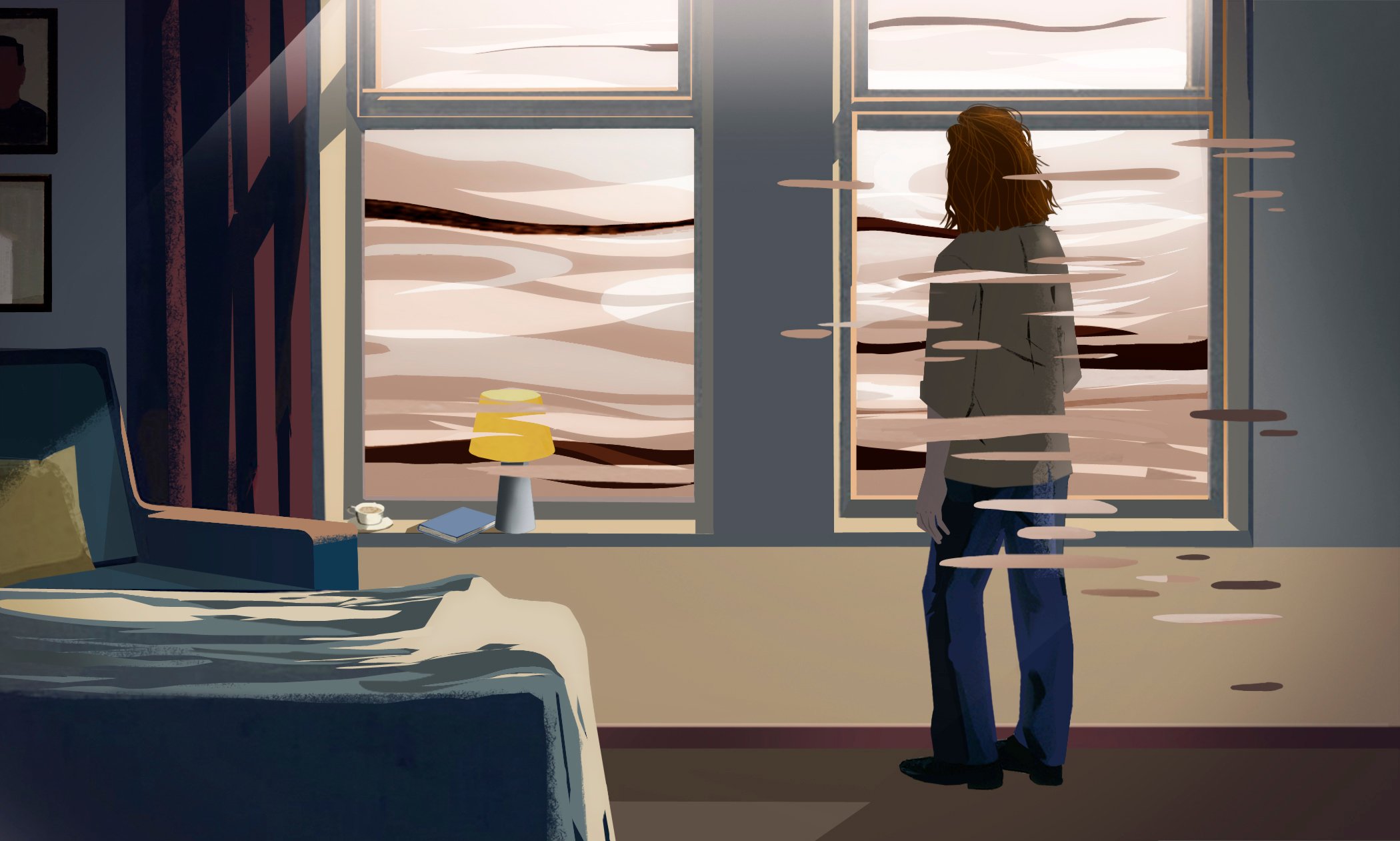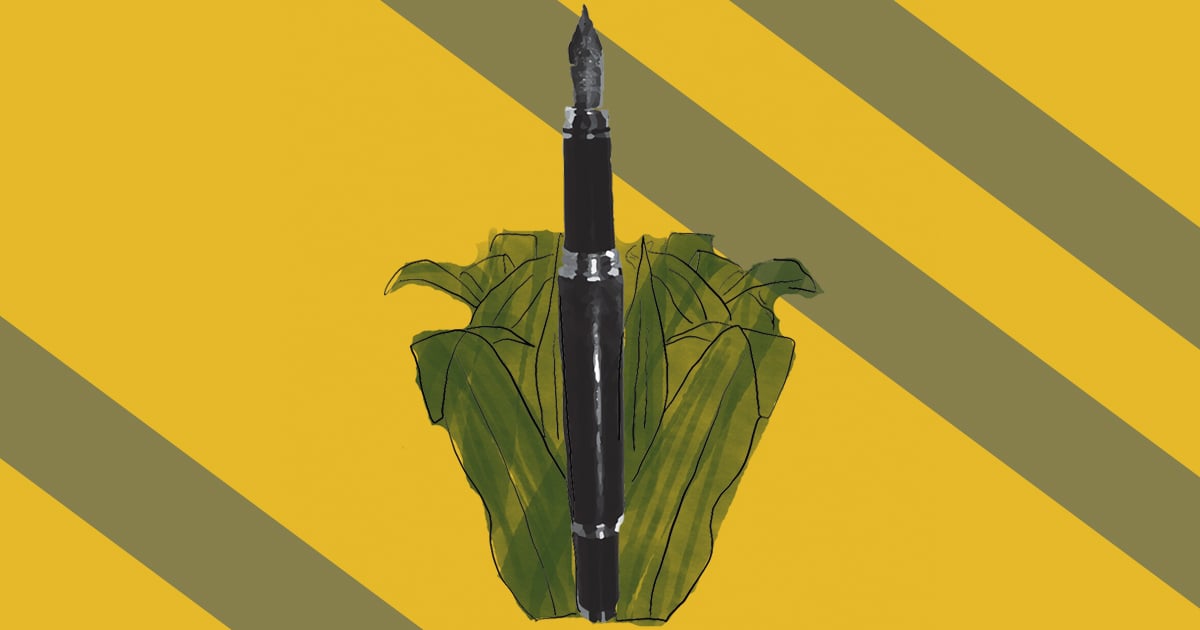
Short Story Contest Finalist: ‘Melanie Lewis Plays Dominoes’

“Try unearthing something fresh” is Amelia Gray’s advice to writers of short fiction. “The best stories have something that needs to be said urgently: now, today, this very moment.”
Freshness and urgency is a difficult combination for a writer to achieve, but many entrants in this year’s Observer short story contest, guest judged by Gray, hit the mark. The five finalists are arguably our strongest batch yet, but getting there required some punishing decisions.
Throughout September we’ll publish the four runners up, in no particular order, leading up to the winning story in our October issue.
First up is Nancy Dinan’s “Melanie Lewis Plays Dominoes,” in which the eponymous protagonist, while playing the eponymous game late at night with her father and uncles, hears a story of spousal murder and tries to determine if she is as “full of blackness and soot” as the men in her family.
After the story you’ll find some words about its genesis from the writer herself, who is a Ph.D. student in fiction at Texas Tech and managing editor at Iron Horse Literary Review.
***
Melanie’s daddy once told her about a woman who’d killed her husband with a hammer as he slept. The woman, long before this happened, had been Willie’s partner in a square dance contest, somewhere toward the end of the forties, Willie had said. Maybe the beginning of the fifties. In any case, the square dance contest had been of a time that was now lost to everybody involved.
“Took a hammer,” Willie told her one night. It was in the wee hours and they sat playing dominoes with her uncles. He lifted his fist in demonstration, brought it down two, three times, all the while making a scree scree scree noise like in Psycho. Her uncles, Don and Jack, laughed, and Melanie knew why: Women are crazy. You never trust a woman to be rational, and especially not where it concerns matters of the heart.
“He running around on her?” Jack folded his hands around his dominoes so nobody could get a good look at what he was holding. He and Don sat next to each other, as they always did, a result of some unbreakable twin bond, right hands each cupping a dewy can of High Life. The overhead fixture shed light on them in different ways, seated as they were at right angles to each other, and fixed half of each face in light, half in darkness, so that together, they made one person of substance, one of shadow.
“No!” Melanie hadn’t expected so much vehemence from her father, not as deep into the Old Grand-Dad as he was. “He was snoring, that’s what! Snoring so’s she couldn’t sleep, and after too many nights, she put an end to that.”
Don led, placing a double five in the center of the scratched tabletop. “Ten,” he said, and seeing his dirty fingernails run across her mother’s table, Melanie wondered for a moment what that venerable woman would have said to have seen everything she had once owned and prized all used up, old and broken. But no matter, Melanie thought; she’d never know now. Her mother had been swept down Onion Creek in a flash flood, and now there was nobody to tell Melanie’s uncles to be careful with the nice things, or even to tell Melanie herself to go to bed, that nothing good happened after midnight.
Willie marked the score on an old steno pad, putting a big X underneath Don’s name.
Melanie tried not to let it show, but she was pleased as could be about Don’s play. She held a handful of fives, and she’d been dying to win at least once. Her father and her uncles had been raised at her grandmother’s kitchen table, playing dominoes as soon as the breakfast dishes were cleared. Not for the first time, she wondered how her mother and her father had ended up together — but not the way everybody expected her to. Everybody wondered how Edie Carpenter had settled for Willie Lewis, all vagabond and rough and always down on his luck. But Melanie, having both her mother’s and father’s blood running through her veins, instead wondered how Willie had stood to be hitched to placid old Edie.
Don played, and then Melanie laid the four five. “Fifteen,” she said, pleased to be on the board, pleased that these men let her play with them. It wasn’t because she was Willie’s daughter either, or at least not only because she was Willie’s daughter. They recognized themselves in her, saw that wild and ragged edge, and, at least for now, she was a twenty-year-old girl. Youth was currency here, and she traded off of it freely.
When Willie laid down his domino, she saw in his movement the hammer motion again, and she made a fist herself, tried it out. Willie caught her at it and said, “Something was wrong with her, though. Been treated real badly by her family.” And his eye caught hers, and she knew what he was saying: Worse than what you think I done to you.
She kept her hand in a fist, defiant, mimicking the motion. “Did you win the square dance contest?”
“Now what do you think?”
“I remember that,” Jack said, passing a hand over his mouth and feeling his shirt pocket for his pack of Camels. “What if you had ended up going with that gal?”
“Almost did.” Willie examined his hand and played the four one. “She was a looker. But I told you, something was wrong with her. You remember when the folks told us her family had chained her to the doghouse?”
“They made her wear a collar,” Jack said, cupping a hand around a cigarette to light it. “Didn’t she sleep outside?”
Willie nodded, and got up from the table to get his bottle from the counter. Melanie watched him pour a finger or two, and then she got up to stand beside him. He fished ice out of a plastic bag in the sink and shook cold water off his fingertips. “Her old man was dead by the time we went to that contest, though.”
When he returned to the table, Melanie refilled her glass and stood looking out the window, listening to the three men and watching the gray sphinx moths dart in and out of the porch light. She’d turned her dominoes facedown and wasn’t worried about the men peeking. She thought about being chained out there, wearing a dog collar all night long, and the thought didn’t bother her much. When she sat back down, she took one of Jack’s cigarettes and lit it, pursing her lips the way she’d seen women do.
Don played without scoring. “Did it stop for her then?”
Willie, seated again, shrugged. “Don’t know. Don’t know much about anything that happened to that gal, but I remember all the men burying her father.”
Willie was ten years older than his twin brothers, and there were lots of stories he knew that they didn’t.
“He didn’t go to a funeral parlor?” Melanie asked. She could tell her uncles were afraid to look stupid, afraid of Willie’s incidental, almost accidental, cruelty.
Willie sat up in his chair. “Nope. No funeral parlors out in the country until the late fifties, maybe sixties. We’d never even heard of embalming. They just put the dead person on a door, propped up on sawhorses, and the grown folks sat up all night with them. In the morning, they’d put the dead person in a casket and go and bury them.”
It was Willie’s turn to play but he wasn’t paying attention. Melanie knew the look that crossed his features; he was remembering something just as clear as if it were happening right in front of him.
“I went with them that time, because I’d always wanted to go,” he said. “I always was so interested in dead people, and what happened to them, and the men took this gal’s father to the cemetery on the Old San Antonio Road just above where the Blanco bends. Skyview, maybe? It’s still there. You can see it when you drive that road, but it’s not the one where people still put flowers on the grave. Those cheap old plastic flowers.” He shook his head, disgusted.
“What happened?” Melanie stirred her drink with a finger then sucked off the taste, rubbing the fingertip on her tongue. She was aware of her uncles watching.
“Oh,” her father said, leaning back in his chair and examining the soles of his work boots. “They hit water when they were digging. They broke through that clay and the grave started filling up.”
Jack asked her father if they’d dug a new grave, but his eyes stayed on Melanie.
Willie shook his head. “Nope. They put the casket in there, and it started floating, so one man climbed in and stood on top until they’d put enough dirt back on it to keep it down. He crawled out of the grave and he was covered in this red mud, and I’m not ashamed to admit that I like to have gotten sick thinking about that mud on his britches.”
“It’s your turn,” Don told Willie, and Melanie caught a meanish glint in Don’s eyes. There wasn’t any reason for it, as far as Melanie could tell, but it was there nonetheless. It was how he was, how they all were. Melanie too.
“How long was this before the square dance contest?” Jack asked.
“Oh, years. Maybe ten. That girl’s trouble didn’t end when her father died.”
Willie finally played, without scoring. When it came around to Melanie, she played the six four and scored twenty. She’d pulled ahead for once, and she thought it was maybe because her father wasn’t paying attention.
“You snore, Will?” Jack asked him. “If you’d have married that woman would she have killed you?”
“Don’t know, but I wouldn’t have married her. Not my type, even though she was real pretty.”
“Edie didn’t look like much at all,” Don said, shaking his head as if amazed that Willie had married her.
“Hey,” Willie said. “That’s Melanie’s mother you’re talking about.” They all looked at her as if she might care.
Melanie shrugged. “She was fat and had bad skin and she was always mad at you.”
Willie regarded her, his drink near his lips. “No, you wouldn’t understand, would you?” Jack and Don exchanged a look. She could tell they were uncomfortable. Willie took a sip, licking the taste of whiskey off his lips. “You’re going to make some man miserable one day, aren’t you?”
She laid down her final domino, scoring five. It wasn’t enough to get her past two fifty. “Doubt it,” she said. “I doubt I’ll ever get married.”
“Probably for the best,” Jack said, chuckling, his instinct always to lighten the mood.
Melanie looked at Jack, hating him for a moment, hating him and Don and her father and herself. She was just like them, full of blackness and soot, and she was irrational to boot. Her fist clenched again, again as if she were holding that hammer, and she thought about lifting it up and bringing it down: scree scree scree. It probably felt good to that woman, to yell Shut up! and put an end to an accumulation of noise that had finally been too much to bear. And then wouldn’t the town talk, she thought, wouldn’t they have a story that would last them for ages. The stories were always better when they were surprising, but this was good enough. A dog collar, a floating casket, a hammer and a husband. And somewhere behind it the woman, the irrational woman, and nobody even knew what happened to her because she was hardly a part of the story. What happened to her wasn’t even news; she’d been bound to snap sooner or later.
Melanie thought, suddenly, of a preacher who had once told her she was immortal, that if she would only become a Christian she would live forever, but she couldn’t bear the idea, couldn’t stand to be herself for eternity.
Outside, the wind whistled in the chimes, and Melanie felt a pity for the moths, for their unrequited courtship of the light, and for her mother’s kitchen table, which had outlived the person who’d cared for it. Go to bed, her mother was not there to say. The pity surprised her, hurt her, but then it was gone.
***
Nancy Dinan on “Melanie Lewis Plays Dominoes”
“This story was inspired, like so much of my writing, by a conversation with my dad, who is a fantastic storyteller. He was a contestant in a square dance contest in Tennessee as a high school student, and he’d been surprised to discover his partner had had such a hard home life. Here, I’m interested in how Melanie’s dad’s story makes her choose sides between her mother and her father, and how this choice shapes her character.”


